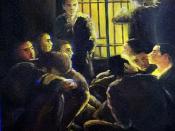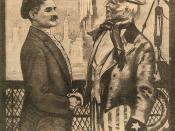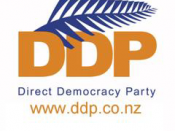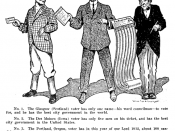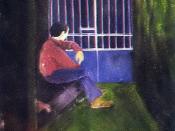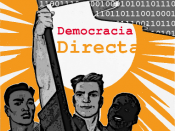Democracy Presented By: Stephen Ju, Seb Urban and Chris Woodward A democracy is the form of government in which the people have the right to control their own destiny. In a democracy, the people have the final authority, meaning that they have the right to make or at least influence decisions that affect their everyday lives. The term áðdemocracyáñ originated from the Greek words áðkratos,áñ meaning power and áðdemos,áñ meaning áðpeopleáñ. These two terms together stand for power to the people. Today, democracy is known as the best method that is chosen by many societies to meet diverse needs. The main aim of democracy is Common good. In a democracy, the majority has the power to vote on making the decisions that satisfies their will. This is called democratic decision-making. There are actually two different types of Democracy: Direct Democracy and Representative Democracy. Direct Democracy involves many people going to a centre to vote directly on an issue based on their own ideas and opinions.
In a Representative Democracy, the citizens can vote by simply representing themselves in the form of a secret ballot. In other words, people elect leaders to act for them in the government system. Also, the government has very limited powers other itáïs people and will always respects the peopleáïs rights. Individual citizens in a democratic society not only live to enjoy their rights and freedoms, but also take serious responsibilities of living democratically. Several ways for them to accomplish this is to maintain human dignity, respects the rights of others, work towards the common good, maintain a strong sense of rights and wrongs, and to demonstrate open communication and full participation.
There are eight main elements to Democracy itself. These elements are: 1. Rule of Law èCEveryone should adhere to the law. Even the government must abide by these rules.
2. Political Equality èCEvery citizen under a Democratic society has the right to vote, speak on public issues, and run for office.
3. Common Good èCCitizens should work towards making the most people happy, safe, and secure. All citizens should care for others.
4. Personal Freedoms èCCitizens should enjoy freedoms such as freedom of religion, expression, and so on.
5. Human Dignity èCAll citizens should protect the dignity of their fellow citizens.
6. Political Freedoms èCCitizens should be allowed to speak, form associations, run for office, and vote without having negative feelings put upon them.
7. Being Informed and Getting Involved èCCitizens should participate with issues that relate to their community, world, and nation.
8. Respect èCCitizens in a Democratic society should respect the rights of one another.
Therefore, Democratic societies are needed in nations to maintain peace, respect, co-operation, and safety, in order to maintain a civil government system.
In William Goldingáïs Lord of the Flies, Democracy is used to show the behaviour of Ralpháïs group. As mentioned earlier, there are two different types of Democracy: Representative Democracy and Direct Democracy. Direct Democracy involves many people going to a centre to give their individual votes that are based on their opinions. In a Representative Democracy, the citizens can vote by simply electing a leader to represent them. In Ralpháïs group, Direct Democracy was displayed through the use of the conch. If any member wanted to call a meeting, they would simply blow through the conch and everyone would come running. This would then enable them to have a meeting to discuss how things should be changed, what the weekáïs accomplishments were, etc. This form of government is very similar to the system run by the ancient Greeks. The senator would call a meeting in the forum, and everyone would come running to hear what the senator had to say. However, during this time it was mandatory to attend, as the government needed all the support it could get. If a person did not attend, they would be charged a fine for their absence.
Representative Democracy was also portrayed at the beginning of the book, in which the children have a vote for who will be the chief. This reflected representative democracy in the sense that the entire group of kids voted Ralph as their leader, so if anyone had any suggestions on how the group should be run, they would discuss it with their leader Ralph in order for it to be taken into consideration.
